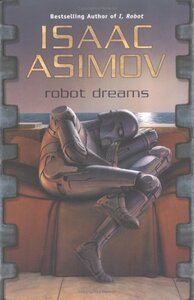Take a photo of a barcode or cover
I think that this was a good introduction to Asimov. It presented his themes and ideas as far as I know, between multivac and the positronic brains, that I'll have a leg up when I start another of his books. I have to say that I felt misled by the title, since I wanted me some robot stories and there were only really four robot/AI stories in the lot. Robot Dreams was probably my favorite of the stories, but others were good too. Personally, I could have cared less about the Martian Way and don't really get why people like it so much.
I really enjoyed Asimov's scientific yet practical approach to his subjects. He didn't lose me in the science of it as much as some sci fi authors, and kept the element of human unpredictability and emotion in his stories.
I will definitely enjoy his AI themed books.
I really enjoyed Asimov's scientific yet practical approach to his subjects. He didn't lose me in the science of it as much as some sci fi authors, and kept the element of human unpredictability and emotion in his stories.
I will definitely enjoy his AI themed books.
I love Issac Asimov and all of his books I don't think that I have read one that I don't like.
dark
funny
mysterious
reflective
medium-paced
Plot or Character Driven:
Plot
Strong character development:
N/A
Loveable characters:
Yes
Diverse cast of characters:
Yes
Flaws of characters a main focus:
No
Lots of really fun and interesting story. Many of these stories have been retold and updated in modern books, TV and movies.
After reading I, Robot and finishing the bulk of the Robot stories in The Complete Robot, I decided to jump to the follow-up collections. There is some overlap, but it also includes a new robot story and some of Asimov’s other Science Fiction with many great stories.
“Introduction” (1986)
Asmiov talks about legacy and predictions in light of his Science Fiction career. He comes off as somewhat egotistical, but I guess 40 years of success will do that. It’s also funny to hear about what he considered successful predictions in the mid-1980s.
"Little Lost Robot" (1947) 4 Stars {also in I, Robot}
This one has a neat idea, though the Robot God Complex thing is getting a little weird. Like, I think these say some more interesting things about people in the 1940s.
"Robot Dreams" (1986) 2 Stars [a Robot Story]
Susan Calvin character assassination.
"Breeds There a Man...?" (1951) 2 Stars
Really long and kind of boring. This is a sort of conspiracy Science Fiction that needs to be really good to catch my interest. This needed to have a better hook, more urgency, and be about half as long.
"Hostess" (1951) 3 Stars
This is better conspiracy theory Science Fiction as it has a cool alien species and a better framing story. However, the gender ideology of the time makes its logic quite antiquated.
"Sally" (1953) 3.5 Stars {also in The Complete Robot}
The ending is almost worthy of Stephen King.
"Strikebreaker" (1957) 4 Stars
A nice little treatise on superstition and taboo. I’m not sure I like the title, though.
"The Machine that Won the War" (1961) 3 Stars [Multivac 9]
I tend to like the parts of this that involve Multivac human error. I’m just still undecided on the ending here. Also, I think the middle gets bogged down by some unnecessary detail.
"Eyes Do More Than See" (1965) 2 Stars
Meh. The idea doesn’t go anywhere.
"The Martian Way" (1952) 4.5 Stars
It’s kind of funny that Asimov noted space euphoria as the thing he got right in this story as opposed to demagogues using data manipulation to create fake crises that rally their base.
"Franchise" (1955) [Multivac 2] 2 Stars
This is actually the second published Multivac story, and it’s really silly. This one is only going to get worse as time goes on. It made me really wish that people cared about voting this much.
"Jokester" (1956) 1 Star [Multivac 6]
This story is a joke, right? I really wish Asimov used this to say something about humor.
"The Last Question" 3 Stars (1956) [Multivac 5]
I’m not a fan of the twist ending, but this is the kind of story that gets young people interested in science.
"Does a Bee Care?" (1957) 3 Stars
This is an interesting idea and a fine little story about the influence of migration.
"Light Verse" (1973) 3.5 Stars {also in The Complete Robot}
A bit predictable, but I rather like these satisfying robot revenge stories.
"The Feeling of Power" (1958) 3 Stars
A weird lost technology piece that sort of works… It still went on a little long for me.
"Spell My Name with an S" (1958) 4 Stars
This is a really good look at how inconsequential actions can have massive effects. It’s a shame about the stupid alien garbage at the end. Ignore the last section, and it makes this story much better.
"The Ugly Little Boy" (1958) 4 Stars
A sweet little story about a little boy finding acceptance. It’s one of Asimov’s favorites for a good reason.
"The Billiard Ball" (1967) 4 Stars
It’s a story based partially on science with a particular look at human nature.
"True Love" (1977) 4 Stars [Multivac 14] {also in The Complete Robot}
Predictable? Maybe. But I rather enjoyed this story for the comeuppance in the ending.
"The Last Answer" (1980) 1.5 Stars
Wasting immortality on an unimaginative asshole…
"Lest We Remember" (1982) 4 Stars
Okay, I’ve complained a lot about Asimov’s characters, especially the assholes, like in the previous story. This story has an asshole, but Asmiov does something with him and comments on how the main character’s attitude prevents him from using his abilities to the fullest. It’s pretty good.
“Introduction” (1986)
Asmiov talks about legacy and predictions in light of his Science Fiction career. He comes off as somewhat egotistical, but I guess 40 years of success will do that. It’s also funny to hear about what he considered successful predictions in the mid-1980s.
"Little Lost Robot" (1947) 4 Stars {also in I, Robot}
This one has a neat idea, though the Robot God Complex thing is getting a little weird. Like, I think these say some more interesting things about people in the 1940s.
"Robot Dreams" (1986) 2 Stars [a Robot Story]
Susan Calvin character assassination.
"Breeds There a Man...?" (1951) 2 Stars
Really long and kind of boring. This is a sort of conspiracy Science Fiction that needs to be really good to catch my interest. This needed to have a better hook, more urgency, and be about half as long.
"Hostess" (1951) 3 Stars
This is better conspiracy theory Science Fiction as it has a cool alien species and a better framing story. However, the gender ideology of the time makes its logic quite antiquated.
"Sally" (1953) 3.5 Stars {also in The Complete Robot}
The ending is almost worthy of Stephen King.
"Strikebreaker" (1957) 4 Stars
A nice little treatise on superstition and taboo. I’m not sure I like the title, though.
"The Machine that Won the War" (1961) 3 Stars [Multivac 9]
I tend to like the parts of this that involve Multivac human error. I’m just still undecided on the ending here. Also, I think the middle gets bogged down by some unnecessary detail.
"Eyes Do More Than See" (1965) 2 Stars
Meh. The idea doesn’t go anywhere.
"The Martian Way" (1952) 4.5 Stars
It’s kind of funny that Asimov noted space euphoria as the thing he got right in this story as opposed to demagogues using data manipulation to create fake crises that rally their base.
"Franchise" (1955) [Multivac 2] 2 Stars
This is actually the second published Multivac story, and it’s really silly. This one is only going to get worse as time goes on. It made me really wish that people cared about voting this much.
"Jokester" (1956) 1 Star [Multivac 6]
This story is a joke, right? I really wish Asimov used this to say something about humor.
"The Last Question" 3 Stars (1956) [Multivac 5]
I’m not a fan of the twist ending, but this is the kind of story that gets young people interested in science.
"Does a Bee Care?" (1957) 3 Stars
This is an interesting idea and a fine little story about the influence of migration.
"Light Verse" (1973) 3.5 Stars {also in The Complete Robot}
A bit predictable, but I rather like these satisfying robot revenge stories.
"The Feeling of Power" (1958) 3 Stars
A weird lost technology piece that sort of works… It still went on a little long for me.
"Spell My Name with an S" (1958) 4 Stars
This is a really good look at how inconsequential actions can have massive effects. It’s a shame about the stupid alien garbage at the end. Ignore the last section, and it makes this story much better.
"The Ugly Little Boy" (1958) 4 Stars
A sweet little story about a little boy finding acceptance. It’s one of Asimov’s favorites for a good reason.
"The Billiard Ball" (1967) 4 Stars
It’s a story based partially on science with a particular look at human nature.
"True Love" (1977) 4 Stars [Multivac 14] {also in The Complete Robot}
Predictable? Maybe. But I rather enjoyed this story for the comeuppance in the ending.
"The Last Answer" (1980) 1.5 Stars
Wasting immortality on an unimaginative asshole…
"Lest We Remember" (1982) 4 Stars
Okay, I’ve complained a lot about Asimov’s characters, especially the assholes, like in the previous story. This story has an asshole, but Asmiov does something with him and comments on how the main character’s attitude prevents him from using his abilities to the fullest. It’s pretty good.
challenging
dark
mysterious
reflective
medium-paced
Plot or Character Driven:
Plot
Strong character development:
Complicated
Loveable characters:
Yes
Diverse cast of characters:
Yes
Flaws of characters a main focus:
No
Great ideas for stories, especially considering the time it was written. There are a few that were absolute misses for me, but quite a few that really made me think and even two that pulled on my emotions a bit.
Twenty-one short stories from the 1940s to the 1980s that explore what the future could come to be, in terms of technological advances and humanity's capacity to evolve, fill the pages of Robot Dreams by Isaac Asimov.
To read this, and other book reviews, visit my website: http://makinggoodstories.wordpress.com/.
Spanning a variety of story types, with some being near future realities set in a world familiar to its audience to those of a harder science fiction slant, the short stories entertain and educate readers while offering an opportunity to reflect upon the human condition and more generally contemplate the world we have. As is generally true of a collection, some of the stories resonated more and were more (eerily) relatable and recognizable as a potential future (or current) situation; his predictions for some technologies and human behaviors struck me as rather eerie in the accuracy he was able to depict current realities of life. Asimov's focus on characters demonstrates more easily the world they inhabit and their reliance upon various technologies or ways of life than if he were to simply describe the world in which his characters live.
Overall, I'd give it a 3.5 out of 5 stars.
To read this, and other book reviews, visit my website: http://makinggoodstories.wordpress.com/.
Spanning a variety of story types, with some being near future realities set in a world familiar to its audience to those of a harder science fiction slant, the short stories entertain and educate readers while offering an opportunity to reflect upon the human condition and more generally contemplate the world we have. As is generally true of a collection, some of the stories resonated more and were more (eerily) relatable and recognizable as a potential future (or current) situation; his predictions for some technologies and human behaviors struck me as rather eerie in the accuracy he was able to depict current realities of life. Asimov's focus on characters demonstrates more easily the world they inhabit and their reliance upon various technologies or ways of life than if he were to simply describe the world in which his characters live.
Overall, I'd give it a 3.5 out of 5 stars.
adventurous
emotional
mysterious
reflective
medium-paced
Plot or Character Driven:
Plot
Strong character development:
Yes
Loveable characters:
Yes
Diverse cast of characters:
Yes
Flaws of characters a main focus:
No






